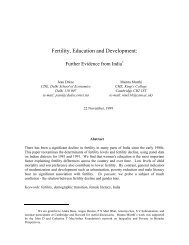The-Polyester-Prince
The-Polyester-Prince
The-Polyester-Prince
- No tags were found...
Create successful ePaper yourself
Turn your PDF publications into a flip-book with our unique Google optimized e-Paper software.
A PERSUASIVE YOUNG BANIAAmong all the 550-odd princely rulers left, with British Residents at their shoulders,to run their domains in the last years of the Raj, few were more eccentric thanMahabat khan, the Nawab of Junagadh. <strong>The</strong> Nawab’s family had run this fiefdom,one of several in a political jigsaw covering the Saurashtra peninsula in Gujarat,since a faujdar or military commander of the Mughal Empire named Sher Khan Babifounded his own subordinate dynasty in 1690. Two and a half centuries later, thiswarrior’s descendant was best known for his love of dogs. Mahabat khan had 150 ofthem, with an equal number of dog-handlers on his payroll and individual quartersfor all the canine retinue. To celebrate the 1wedding’of one canine pair, the Nawabwas reputed to have spent two million rupees (then worth about Ç150 000 sterling)and to have given his 700 000 subjects a public holiday.<strong>The</strong> Nawab was the first political target to come into the sights of Dhirubhai Ambani,although it is unlikely that he was ever specifically aware of it. It was during amovement aimed at overthrowing the Nawab’s rule and securing Junagadh’saccession to India during the Partition of British India in 1947 that Ambani, then ateenage high school student, had his first experience of political organisation and hisfirst brushes with authority.It was the only moment in modern times that Junagadh has figured in thecalculations of nations and statesmen. Even in the 1990s, Junagadh and itssurrounds, known as the Kathiawar region, remains one of the quietest, mosttraditional regions of India, and one of the least accessible in the otherwise busynorthwest coastal area of the country.A few times a week, a turboprop flies into the simple airstrip at Keshod, unloadingpeople from Bombay or the Gujarati Diaspora overseas coming to visit their relativesand make offerings to family gods at local temples. In the town itself, clusters of1940s Ford Mercury taxis wait for groups of passengers or for hire at weddings. <strong>The</strong>railway network was built to connect each of the several former principalities ofKathiawar to the outside world rather than with each other. Once you are inKathiawar, all now part of Gujarat state, traveling between towns often means oneor more changes of line and extensive doglegs and backtracking in the journey. <strong>The</strong>last steam engine on regular service in India, apart from scenic mountain railways,puffed between Junagadh and the Gir sanctuary for the last Asiatic lions until 1996.<strong>The</strong> land itself is dry, open and stony. <strong>The</strong> monsoon rains quickly run off down theshort rivers and nuilahs that radiate from the central rocky hinterland out to the sea.<strong>The</strong> roads are lined with stunted pipul (fig) trees, and the stony fields are fencedwith straggling rows of cactus. <strong>The</strong> standard building material is a porous duncolouredstone cut by saws into ready-made blocks from pits near the seashore.<strong>The</strong>re are few of the modern ferro-cement extravagances built by the newly rich,hardly any of the industrial plants and their residential colonies seen extending outinto farmland in other Indian regions, and only a few private cars.But if the landscape is monotonous, Kathiawar’s people compensate for it withriotous colour where they can. <strong>The</strong> women drape themselves with cotton scarves tiedyedin red and orange. <strong>The</strong> local scooter-taxi is the Enfield motorcycle grafted to afat tray resting on two wheels at the back, with the handlebars decked with colouredlights, electric horns and whirling windmills. <strong>The</strong> homes of wealthy merchants aredecorated with mouldings of swans, peacocks, flamingos, parrots, elephants, lions




